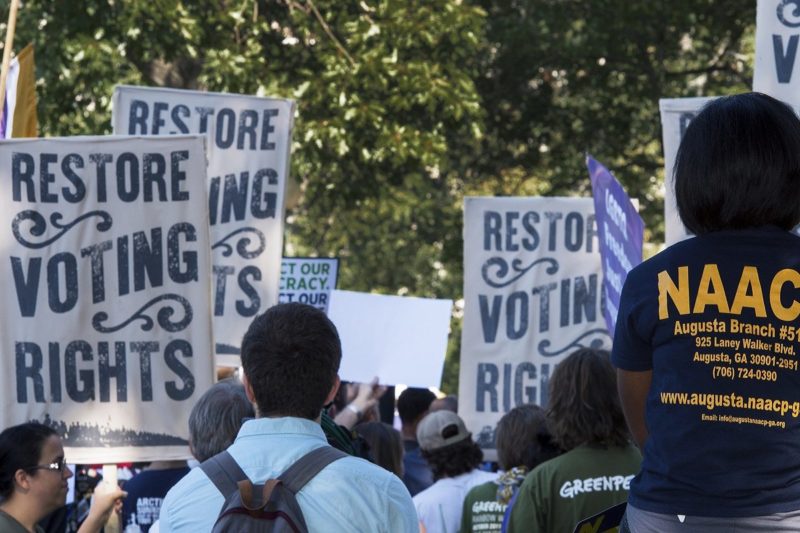Court Blocks North Carolina’s ‘Discriminatory’ Voter ID Law
“[T]he new provisions target African Americans with almost surgical precision," Circuit Judge Diana Gribbon Motz wrote for the court, describing the North Carolina GOP's voter ID law.

A unanimous panel of the Fourth Circuit Court of Appeals struck down North Carolina’s elections law, holding that the Republican-held legislature had enacted the law with discriminatory intent to burden Black voters and that it therefore violated the Voting Rights Act of 1965.
The ruling marks the latest defeat of voter ID laws passed by GOP-majority legislatures across the country.
“We can only conclude that the North Carolina General Assembly enacted the challenged provisions of the law with discriminatory intent,” Circuit Judge Diana Gribbon Motz wrote for the court.
HB 589 required in-person voters to show certain types of photo ID beginning in 2016, and either curtailed or reduced registration and voting access tools that Black voters disproportionately used, including an early voting period. Black voters also disproportionately lack photo IDs.
Republicans claimed that the law was intended to protect against voter fraud, which has proven exceedingly rare in Republican-led investigations. But voting rights advocates argue that the law was intended to disenfranchise Black and Latino voters.
The ruling marks a dramatic reversal of fortune for the U.S. Justice Department, the North Carolina chapter of the NAACP, and the League of Women Voters, which had asked the Fourth Circuit to review a lower court ruling against them.
U.S. District Court Judge Thomas Schroeder in April ruled that plaintiffs had failed to demonstrate that the law hindered Black voters’ ability to exercise political power.
The Fourth Circuit disagreed.
“In holding that the legislature did not enact the challenged provisions with discriminatory intent, the court seems to have missed the forest in carefully surveying the many trees,” Motz wrote. “This failure of perspective led the court to ignore critical facts bearing on legislative intent, including the inextricable link between race and politics in North Carolina.”
The Fourth Circuit noted that the Republican-dominated legislature passed the law in 2013, immediately following the U.S. Supreme Court’s ruling in Shelby v. Holder, which struck a key provision in Section 4 of the Voting Rights Act.
Section 4 is the coverage formula used to determine which states must get pre-clearance from the Department of Justice or the District Court for the District of Columbia before making any changes to election laws.
The day after the Supreme Court issued its ruling in Shelby, the Republican chairman of the Senate Rules Committee announced the North Carolina legislature’s intention to enact an “omnibus” election law, the appeals court noted. Before enacting the law, however, the Republican-dominated legislature requested data on the use, by race, of a number of voting practices.
After receipt of the race data, the North Carolina General Assembly enacted legislation that restricted voting and registration, all of which disproportionately burdened Black voters.
“In response to claims that intentional racial discrimination animated its actions, the State offered only meager justifications,” Motz continued. “[T]he new provisions target African Americans with almost surgical precision.”
The ruling comes a day after the Rev. Dr. William J. Barber II, president of the North Carolina chapter of the NAACP and one of the primary organizers of Moral Mondays, gave a rousing speech at the Democratic National Convention that brought convention goers to their feet.
During a protest on the first day of the trial, Barber told a crowd of about 3,500 people, “this is our Selma.”
